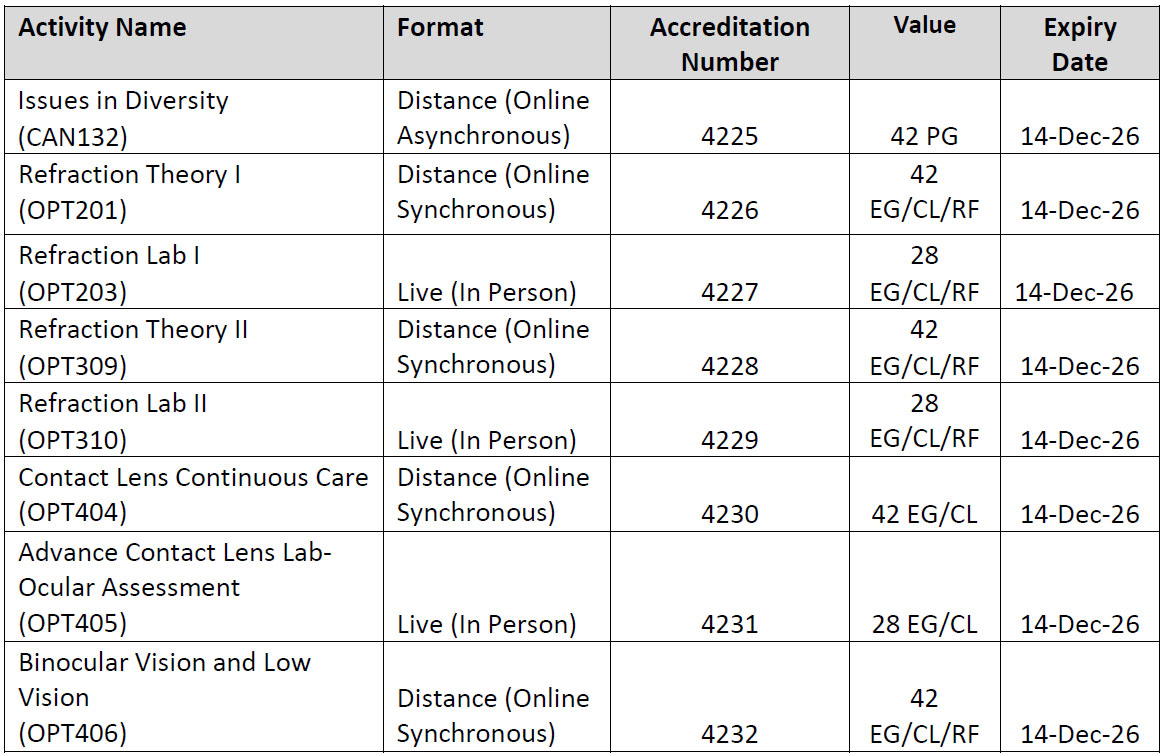Learn more about the academic programs we are delivering in Winter 2025. If you have any questions about part-time studies, please contact us.
Opticianry - Refraction & Essentials
Seneca College Certificate
Overview
The Opticianry - Refraction & Essentials certificate will provide you with everything you need to meet the national competencies for Canadian opticians, which were updated in Nov. 2019. Refraction, contact lenses, binocular and low vision, and diversity and Indigenous content will be covered.
If you graduated from the Opticianry diploma program prior to 2023, this will help you address skill and knowledge gaps. It complements technical backgrounds in the optical sciences, with the theory, practical knowledge and skills needed for contact lens and eyeglass dispensing. In addition, you'll receive the latest training on interacting with diverse populations.
The Opticianry - Refraction & Essentials program has been accredited by the Quality Assurance Committee of the College of Opticians of Ontario.
Entry Requirements
To apply for Seneca's Opticianry - Refraction & Essentials program, you must have:
- an Opticianry diploma or an equivalent course of study from a recognized postsecondary institution
Note:
- Official transcripts must accompany program application
- Students must have studied eyeglasses and contact lenses to be accepted and successful in the program
Recommended:
College English (COM101, previously EAC 150) or a minimum TOEFL Score of 600.
Application
To apply for the Opticianry - Refraction & Essentials certificate program, please complete the application form by Friday, December 15th 2023.
In addition to completing the application form, you must also submit supporting transcript(s) per the program's entry requirements to Annie Kirkham at annie.kirkham@senecapolytechnic.ca. Please use "Refraction and Essentials Application" as the subject line of your email when submitting your transcript(s).
If you have any questions about the entry requirements or general questions about the program, please contact:
Annie Kirkham
Program Assistant
annie.kirkham@senecapolytechnic.ca
416-764-0985
Yasmeen Syed
Academic Program Manager
yasmeen.syed@senecapolytechnic.ca
416-764-0965
Part-time Studies courses are being offered in either of the following four formats: Online, Flexible, In-person, Hybrid. Click Availability below to see current offerings.
Curriculum
Certificate Requirements
This subject explores ocular pathology in terms of physiological complications of contact lens wear, inflammation, toxicity and allergy. Students learn to identify common anomalies of the eye that affect contact lens wear. Examination and treatment procedures are included. Emphasis is placed on management and referral process for advanced care.
This subject expands on the clinical skills learned in Contact Lens Lab I. Students apply the principles of patient assessment and advanced examination techniques to investigate the ocular structures to detect ocular conditions that are contraindications for contact lens wear. Emphasis is placed on dry eye assessment, interpretation of findings and management.
This subject introduces students to the testing procedures used in the preliminary eye examination and the theories and the instrumentation used in objective refraction. Students will learn how to identify ametropia using the auto-refractor and the retinoscope and what correcting methods are available.
Building on the theory of visual assessment and refractometry students learn how to perform subjective and objective patient assessment and use adequate instrumentation to establish the base line data for subjective refraction. Emphasis is placed on performing objective refraction using the auto-refractor and the retinoscope.
This subject introduces students to the physiology of binocular vision and the specific diseases that contribute to vision loss. Students learn to identify and interpret the clinical symptoms and signs of associated binocular conditions, low vision and vision loss and select appropriate visual aid treatments for patients with various low vision conditions.
Students critically identify and examine issues in diversity. Specifically, topics pertaining to inequality in various social settings, including but not limited to: race, gender, ethnicity, class and sexual orientation. Incorporating social/legal explanations of diversity, students develop a clear understanding of the groups affected and the possible strategies of community empowerment.
This subject is designed to foster students understanding of subjective refraction and learn instrumentation and protocols used to identify and quantify ametropia. Emphasis is placed on continuing care to promote and maintain patient ocular health.
This subject offers students the opportunity to apply the theoretical knowledge acquired in Refraction Theory II. Students learn how to operate the automated and the manual phoropter to identify ametropia, use instrumentation to assess ocular health, analyze, and interpret findings.
Program Outcomes
The graduate has reliably demonstrated the ability to:
- assess the needs of a patient using ophthalmic tests to address and resolve visual orthosis issues.
- provide optical care that meets professional standards and requirements established by current legislation.
- communicate and collaborate with patients and healthcare professionals maintaining effective and professional interpersonal relationships.
- apply theories of refraction to perform visual assessments.
Accreditation Information

Program Contacts
Annie Kirkham
Program Assistant
Annie.Kirkham@senecapolytechnic.ca
416-764-0985
Yasmeen Syed
Academic Program Manager
Yasmeen.Syed@senecapolytechnic.ca
416-764-0965